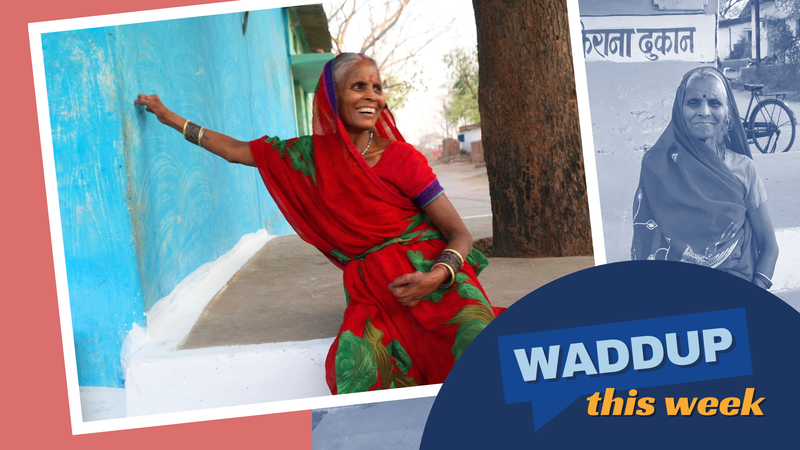Waddup this week #2: ‘The truth will set you free’
Peter Waddup, CEO. The Leprosy Mission Great Britain
‘So Jesus said to the Jews who had believed him, “if you abide in my word, you are truly my disciples, and you will know the truth, and the truth will set you free.”
John 8: 31-32 (NIV)
The US President Franklin D Roosevelt famously said, ‘we have nothing to fear but fear itself.’ These words rang so true for me this week.
The Leprosy Mission has always fought to repeal legislation that discriminates against people affected by leprosy in India. But what I didn't know, until this week, was that there is scientific evidence to show these laws should never have been introduced!
As unkind as it reads, I naively thought The Lepers Act of 1898 could have once been justified as necessary. After all, there was no cure for leprosy until the 1980s. Perhaps it was simply an insensitive way to protect the general public? So I was saddened to learn this wasn't the case. As ever, centuries of prejudice had defeated medical evidence and logic.
There are over 100 laws in India today that discriminate against people affected by leprosy. In some states the police can legally detain beggars affected by leprosy. There is legislation to prevent people affected by leprosy from standing for election or from doing certain jobs.
These existing laws are a vestige of The Lepers Act of 1898 introduced by the British Raj. Yet the Leprosy Commission in India was tasked in the early 1890s to investigate leprosy and its spread. The commissioners personally examined 2,000 people affected by the disease. Their 1893 report concluded: "The amount of contagion that exists is so small that it may be disregarded. And no legislation is called for on the lines either of segregation or of interdiction of marriage with lepers.” Instead voluntary isolation was recommended in the absence of a cure.
Even after independence in 1947, new discriminatory laws were made. Leprosy was recognised as grounds for divorce. People affected by the disease were prohibited from entering marketplaces and libraries. They could not be appointed as members of university academic boards.
Leprosy has always been one of the world's most stigmatised diseases. It is of no surprise, therefore, that healing people of leprosy was firmly on Jesus' heart. Immediately after Sermon on the Mount, Jesus' most famous teaching, He goes on to heal of man of leprosy. This man would have been feared, loathed and outcast from society.
Jesus didn't just simply physically heal the man of leprosy. He told him to show himself to the priest, a necessary action to be accepted into society again. This man was healed physically, mentally, socially and spiritually! Jesus is surely the ultimate advocate for people affected by leprosy and, as Christians, we must follow his example.
Discrimination is always fuelled by ignorance and fear. So the best way to tackle unfounded prejudice, as Jesus showed, is to bring it into the light. By doing so, its power diminishes. Thanks to incredible advocacy efforts, 33 discriminatory laws have been repealed or amended over the past five years in India. There are, however, still more than 100 laws that discriminate against people affected by leprosy. While these laws are still in existence, discrimination against people affected by leprosy cannot end. My colleagues in India are working tirelessly to ensure this legislation is consigned to the history books. Only then can the constitutional right to dignity and equality for every person affected by leprosy be fulfilled.
Simultaneously, the team in India is training and empowering people affected by leprosy to stand up for their rights. I have been so thrilled to meet some of our Leprosy Champions during my time in India. People like Sharidah, who lives in Chhattisgarh, who now understands her rights. She is fearless at challenging discriminatory laws and the attitudes behind them at local, district and state levels!
It's been quite a journey for Sharidah who was devastated when her husband abandoned her when she first showed signs of leprosy. As if that wasn't enough, she was forced by her fellow villagers to leave due to the stigma. She made her home in one of India's 750 leprosy colonies. But after receiving advocacy training, Sharidah is now a Leprosy Champion! She's also the Secretary of her local self-help group, coordinating advocacy activities for 4,000 people.

Sharidah's biggest success to date has been leading a campaign to secure a piped water supply to her leprosy community. She and thousands of her fellow residents now have safe and clean water to drink. Sharidah had quite a fight on her hands. Yet she liaised with local government and did not give up campaigning until the work was complete. The truth really did set Sharidah free and I for one could not be any more proud of her.